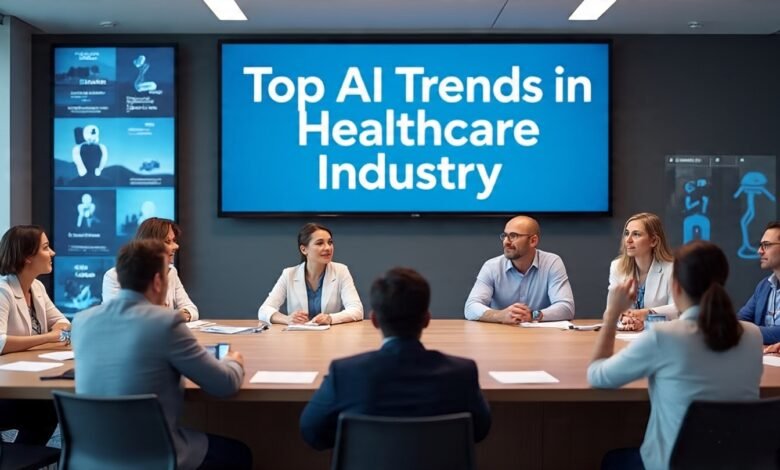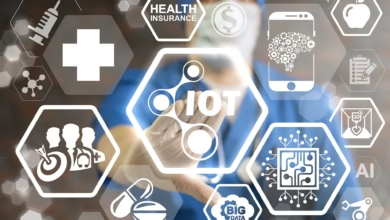Top AI Trends in Healthcare Industry
Discover the top AI trends in healthcare industry transforming patient care, diagnostics, and operations. Explore machine learning, generative AI, and predictive analytics revolutionizing healthcare delivery in 2025 and beyond.

The healthcare industry stands at the precipice of a revolutionary transformation, driven by groundbreaking advances in artificial intelligence and machine learning technologies. As we navigate through 2025, AI trends in healthcare have evolved from experimental concepts to essential components of modern medical practice, fundamentally reshaping how healthcare providers deliver care, make clinical decisions, and manage operations.
Artificial intelligence in healthcare has emerged as a powerful catalyst for addressing some of the most pressing challenges facing the medical field today. From workforce shortages and administrative burdens to diagnostic accuracy and personalized treatment approaches, AI technologies are providing innovative solutions that promise to enhance patient outcomes while reducing costs and improving operational efficiency.
The rapid evolution of generative AI, predictive analytics, and machine learning algorithms has created unprecedented opportunities for healthcare organizations to leverage data-driven insights for better decision-making. Recent studies indicate that 85% of healthcare leaders are actively exploring or implementing AI capabilities, with 64% reporting positive return on investment from their AI implementations. This widespread adoption reflects a fundamental shift in how the healthcare sector approaches innovation and technology integration.
Digital health solutions powered by AI are revolutionizing traditional healthcare delivery models, enabling more personalized, accessible, and efficient care. From AI-powered diagnostic tools that can detect diseases earlier and more accurately than traditional methods, to intelligent automation systems that streamline administrative processes, the impact of artificial intelligence extends across every aspect of healthcare operations. As healthcare organizations increasingly recognize the transformative potential of these technologies, AI trends in healthcare continue to evolve rapidly, promising even more significant advances in patient care and operational excellence in the years ahead.
Enhanced Clinical Decision Support Through AI
Clinical decision support systems powered by artificial intelligence represent one of the most transformative AI trends in healthcare currently reshaping medical practice. These sophisticated AI technologies leverage machine learning algorithms to analyze vast amounts of clinical data, providing healthcare professionals with real-time insights that enhance diagnostic accuracy and treatment recommendations.
Modern AI-powered clinical decision support systems integrate seamlessly with electronic health records (EHRs), analyzing patient histories, laboratory results, imaging data, and medication interactions to identify patterns that might escape human observation. Machine learning models trained on millions of patient records can predict potential complications, suggest optimal treatment pathways, and alert clinicians to critical changes in patient conditions before they become life-threatening.
Predictive analytics within clinical decision support has demonstrated remarkable success in identifying high-risk patients who may require immediate intervention. These AI systems can analyze biometric data, vital signs, and historical health patterns to forecast the likelihood of conditions such as sepsis, cardiac events, or hospital readmissions, enabling proactive rather than reactive care approaches.
The integration of generative AI into clinical workflows has further enhanced decision-making capabilities by providing natural language interfaces that allow clinicians to query complex medical databases using conversational language. This advancement makes AI-powered insights more accessible to healthcare providers regardless of their technical expertise, democratizing access to advanced analytical capabilities.
Ambient AI technologies are revolutionizing clinical documentation by automatically capturing and analyzing patient-provider conversations, extracting relevant medical information, and generating comprehensive clinical notes. This innovation significantly reduces administrative burden while ensuring accurate and complete documentation, allowing healthcare professionals to focus more time on direct patient care rather than paperwork.
AI-Powered Diagnostic Revolution
The diagnostic imaging sector has witnessed unprecedented transformation through artificial intelligence applications, representing one of the most mature and impactful AI trends in healthcare. Machine learning algorithms, particularly deep learning models, have demonstrated remarkable capabilities in analyzing medical images with accuracy levels that often match or exceed human specialists.
AI-powered diagnostic tools are revolutionizing radiology, pathology, and dermatology by detecting subtle abnormalities that might be missed by human observation. Recent breakthroughs include AI systems that can identify early-stage cancers in mammography scans, detect diabetic retinopathy in eye examinations, and analyze skin lesions for potential malignancy with exceptional precision.
Computer vision technologies combined with machine learning have enabled the development of specialized diagnostic applications across multiple medical specialties. In cardiology, AI algorithms can analyze electrocardiograms to detect arrhythmias and predict heart failure risk. In pulmonology, artificial intelligence systems can identify lung nodules and assess their malignancy potential from chest X-rays and CT scans.
The emergence of multimodal AI systems represents a significant advancement in diagnostic capabilities, as these technologies can integrate information from various sources including medical images, laboratory results, patient history, and genomic data to provide comprehensive diagnostic insights. This holistic approach to diagnosis enables more accurate and personalized medical assessments.
Real-time diagnostic support powered by AI is becoming increasingly prevalent in emergency departments and critical care settings, where rapid and accurate diagnosis can be life-saving. These systems can quickly analyze multiple diagnostic modalities simultaneously, providing clinicians with immediate insights that support urgent medical decisions.
Generative AI Transforming Healthcare Operations
Generative AI has emerged as one of the most revolutionary AI trends in healthcare, fundamentally transforming how healthcare organizations approach content creation, documentation, and operational efficiency. This technology’s ability to generate human-like text, images, and data is reshaping multiple aspects of healthcare delivery and administration.
Large language models (LLMs) and other generative AI technologies are revolutionizing clinical documentation by automatically generating comprehensive medical notes, discharge summaries, and patient communication materials. These systems can process complex medical conversations and transform them into structured, professional documentation that meets regulatory requirements while saving significant time for healthcare providers.
Natural language processing capabilities within generative AI are enabling more sophisticated patient communication systems, including AI-powered chatbots that can handle routine inquiries, appointment scheduling, and basic health advice. These systems provide 24/7 availability for patient support while reducing the workload on administrative staff and enabling human resources to focus on more complex patient needs.
The application of generative AI in medical education and training has created new opportunities for immersive learning experiences. AI systems can generate realistic patient scenarios, create customized educational content, and provide interactive simulations that help healthcare professionals develop their skills in safe, controlled environments.
Synthetic data generation represents another significant application of generative AI in healthcare research and development. By creating realistic but anonymized patient data, these technologies enable researchers to train machine learning models and conduct studies while maintaining strict privacy protections and regulatory compliance.
Drug discovery processes are being accelerated through generative AI applications that can design novel molecular compounds, predict drug interactions, and optimize pharmaceutical formulations. These technologies are reducing the time and cost associated with bringing new medications to market while improving the likelihood of successful therapeutic outcomes.
Predictive Analytics and Personalized Medicine
Predictive analytics powered by artificial intelligence represents a paradigm shift toward proactive healthcare management, enabling medical professionals to anticipate health issues before they become critical. This AI trend in healthcare leverages machine learning algorithms to analyze historical patient data, identify risk patterns, and forecast potential health outcomes with remarkable accuracy.
Precision medicine applications of predictive AI are revolutionizing treatment approaches by analyzing individual patient characteristics, including genetic profiles, lifestyle factors, and medical history, to determine optimal therapeutic strategies. Machine learning models can predict how patients will respond to specific treatments, enabling healthcare providers to select the most effective interventions while minimizing adverse reactions.
Population health management has been transformed through AI-powered predictive analytics that can identify disease outbreaks, track epidemic patterns, and allocate resources more effectively. These systems analyze vast amounts of health data from multiple sources to predict community health trends and support public health decision-making.
Chronic disease management benefits significantly from predictive AI technologies that can monitor patient conditions continuously and alert healthcare providers to potential complications before they occur. For diabetes management, AI systems can predict blood glucose fluctuations and recommend adjustments to medication or lifestyle factors to maintain optimal control.
Risk stratification models powered by machine learning enable healthcare organizations to identify high-risk patients who may benefit from intensive monitoring or preventive interventions. These AI tools analyze multiple risk factors simultaneously to create comprehensive risk profiles that guide care management strategies.
Pharmacovigilance applications of predictive analytics help identify potential medication-related adverse events by analyzing patient response patterns and drug interaction data. This capability enables healthcare providers to make more informed prescribing decisions and monitor patient safety more effectively.
Robotic Process Automation in Healthcare
Robotic Process Automation (RPA) combined with artificial intelligence is transforming healthcare administrative operations, representing a crucial AI trend in healthcare that addresses the sector’s persistent challenges with operational efficiency and cost management. These intelligent automation solutions are streamlining repetitive tasks and reducing human error in critical healthcare processes.
Revenue cycle management has been revolutionized through AI-powered automation systems that handle claims processing, billing verification, and insurance authorization with minimal human intervention. These technologies can process thousands of transactions simultaneously while maintaining high accuracy rates and ensuring compliance with regulatory requirements.
Medical coding and documentation processes are being automated through AI systems that can analyze clinical notes and automatically assign appropriate diagnostic and procedure codes. This automation reduces the time required for manual coding while improving accuracy and consistency in medical billing and documentation.
Supply chain management in healthcare facilities benefits from AI-driven automation that optimizes inventory levels, predicts demand patterns, and automates reordering processes. These systems help healthcare organizations reduce costs while ensuring essential supplies and medications are always available when needed.
Appointment scheduling and patient flow management are being enhanced through intelligent automation systems that can coordinate complex scheduling requirements, optimize resource utilization, and minimize patient wait times. AI algorithms consider multiple factors including provider availability, patient preferences, and equipment requirements to create optimal scheduling solutions.
Regulatory compliance processes are being streamlined through automated AI systems that monitor healthcare operations for compliance violations, generate required reports, and ensure adherence to quality standards. This automation reduces the administrative burden on healthcare staff while maintaining high standards of regulatory compliance.
Remote Patient Monitoring and Wearable AI
Remote patient monitoring enhanced by artificial intelligence has become one of the most impactful AI trends in healthcare, enabling continuous health surveillance and early intervention capabilities that extend healthcare beyond traditional clinical settings. AI-powered wearable devices and remote monitoring systems are revolutionizing how healthcare providers track patient health and deliver care.
Wearable AI technologies incorporate sophisticated machine learning algorithms that can analyze biometric data in real-time, detecting anomalies in heart rate, blood pressure, glucose levels, and other vital signs. These devices provide continuous health monitoring that enables early detection of potential health issues before they require emergency intervention.
Telemedicine platforms integrated with AI capabilities are transforming remote healthcare delivery by providing intelligent triage systems, automated health assessments, and AI-powered diagnostic support during virtual consultations. These technologies make healthcare more accessible to patients in remote locations while maintaining high standards of care quality.
Chronic disease management has been revolutionized through AI-enabled remote monitoring systems that track patient adherence to medication regimens, monitor symptom progression, and adjust treatment plans based on real-time data. These systems enable healthcare providers to manage larger patient populations more effectively while providing personalized care.
Mental health monitoring applications of AI include systems that can analyze speech patterns, social media activity, and behavioral data to identify early signs of depression, anxiety, or other mental health conditions. These technologies enable proactive mental health intervention and support.
Emergency response capabilities of AI-powered monitoring systems can automatically detect falls, cardiac events, or other medical emergencies and immediately alert healthcare providers or emergency services. This capability is particularly valuable for elderly patients living independently and those with high-risk medical conditions.
AI Ethics and Data Privacy in Healthcare
The rapid advancement of AI trends in healthcare has brought critical considerations regarding AI ethics, data privacy, and responsible implementation to the forefront of healthcare technology discussions. Healthcare organizations must navigate complex ethical landscapes while ensuring patient data protection and maintaining trust in AI-powered healthcare systems.
Data privacy concerns in AI healthcare applications require robust security frameworks that protect sensitive patient information while enabling the data sharing necessary for machine learning model training and improvement. Healthcare organizations must implement comprehensive data governance policies that comply with regulations such as HIPAA while supporting AI innovation.
Algorithmic bias represents a significant challenge in healthcare AI implementations, as machine learning models trained on biased datasets can perpetuate or amplify existing healthcare disparities. Healthcare organizations must implement fairness auditing processes and ensure diverse representation in training data to prevent discriminatory outcomes.
Transparency and explainability in AI decision-making are crucial for maintaining clinical trust and enabling healthcare providers to understand and validate AI-generated recommendations. Explainable AI technologies are being developed to provide clear insights into how AI algorithms reach their conclusions, supporting clinical decision-making processes.
Informed consent protocols for AI-powered healthcare services must clearly communicate to patients how their data will be used, what AI technologies will be applied, and what potential benefits and risks are associated with these applications. Healthcare organizations must ensure patients understand and agree to AI-enabled care approaches.
Regulatory compliance frameworks for healthcare AI continue to evolve as government agencies develop guidelines for safe and effective AI implementation in medical settings. Healthcare organizations must stay current with regulatory requirements and ensure their AI systems meet all applicable standards for medical device regulation and clinical practice.
Future Outlook: AI Integration and Scalability
The future landscape of AI trends in healthcare points toward unprecedented integration and scalability of artificial intelligence technologies across all aspects of healthcare delivery, research, and administration. Healthcare organizations are increasingly viewing AI not as isolated tools but as fundamental infrastructure components that will define the next generation of medical practice.
Enterprise AI platforms are emerging that provide comprehensive AI capabilities integrated across entire healthcare systems, enabling seamless data sharing, coordinated care delivery, and system-wide optimization. These platforms represent a shift toward holistic AI adoption rather than piecemeal implementation of individual AI tools.
Interoperability standards for healthcare AI are being developed to ensure AI systems from different vendors can communicate effectively and share insights across healthcare networks. This standardization will enable more comprehensive patient care coordination and improved health outcomes through better information sharing.
AI-as-a-Service models are making advanced AI capabilities more accessible to smaller healthcare organizations that may lack the resources for extensive AI infrastructure development. These cloud-based services democratize access to sophisticated AI technologies while reducing implementation costs and complexity.
Continuous learning capabilities of AI systems will enable healthcare technologies to improve automatically over time as they process more data and encounter new clinical scenarios. This adaptive capability will ensure AI-powered healthcare solutions remain current with evolving medical knowledge and practices.
Global health applications of AI are expected to address healthcare disparities by providing advanced diagnostic and treatment capabilities to underserved populations worldwide. AI technologies have the potential to extend expert medical knowledge to remote locations and resource-limited settings, improving global health equity.
Conclusion
The transformation of healthcare through artificial intelligence represents one of the most significant technological revolutions in medical history, with AI trends in healthcare continuing to evolve at an unprecedented pace. From AI-powered diagnostic tools that enhance clinical accuracy to generative AI systems that streamline operations and predictive analytics that enable proactive care, these technologies are fundamentally reshaping how healthcare is delivered, managed, and experienced. The integration of machine learning, natural language processing, and intelligent automation across clinical and administrative workflows is creating more efficient, accurate, and personalized healthcare experiences while addressing critical challenges such as workforce shortages and rising costs. As healthcare organizations continue to embrace AI adoption and develop robust frameworks for AI ethics and data privacy, the future promises even more transformative applications that will democratize access to high-quality healthcare, accelerate medical research, and ultimately improve health outcomes for patients worldwide. The successful implementation of these AI technologies requires careful consideration of regulatory compliance, clinical validation, and ethical implications, but the potential benefits for patients, providers, and healthcare systems make this technological evolution not just inevitable, but essential for the future of medicine.











